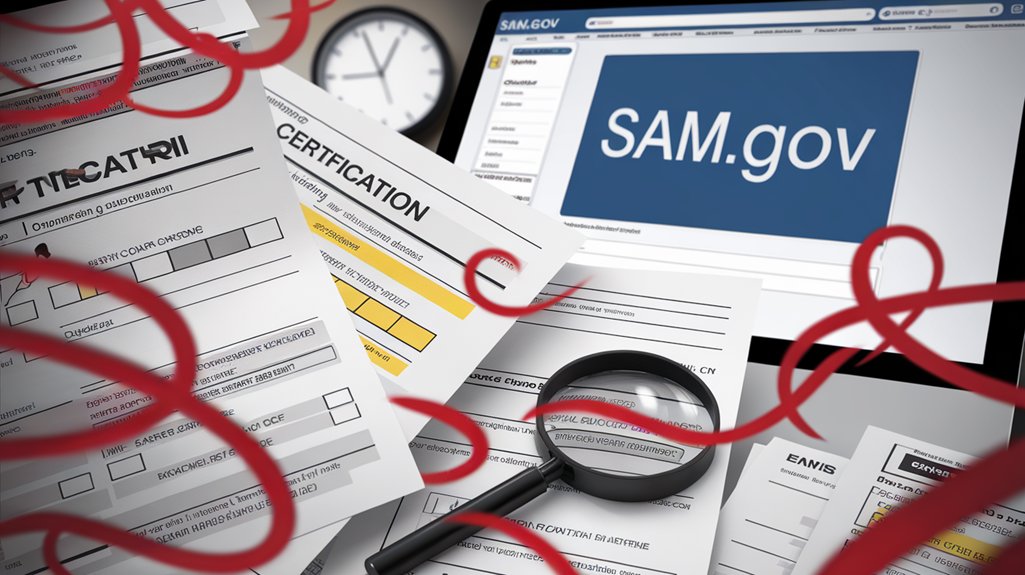Common issues with SAM.gov representations and certifications include using trade names instead of legal entity names, submitting expired TINs, misclassifying business affiliations, and selecting incorrect NAICS codes. These errors can lead to proposal rejection, contract termination, or even suspension proceedings. Companies also struggle with maintaining active registration status and meeting the 60-day deadline for reporting material changes. Proper validation strategies include accurate documentation preparation and regular status monitoring to guarantee continued federal contract eligibility.
Table of Contents
ToggleCommon Representation and Certification Mistakes in SAM

When contractors submit representations and certifications in the System for Award Management (SAM), they encounter numerous pitfalls that can delay or disqualify their applications.
Common errors include using trade names instead of legal entity names and submitting expired Tax Identification Numbers, causing immediate rejection.
Registration pitfalls often involve misclassification of business affiliations, which affects small business status eligibility.
Misclassifying business affiliations can jeopardize small business status eligibility, creating significant procurement obstacles for unwary contractors.
Documentation issues, such as unsigned certifications or expired notarizations, frequently derail otherwise valid submissions.
Compliance challenges extend to incorrect NAICS code selection, which misaligns with actual business activities, and failure to meet the 60-day deadline for reporting material changes.
Many contractors also struggle with contradictory responses between their SAM profile and proposal documents, creating inconsistencies that raise red flags during verification.
A critical post-registration requirement often overlooked is submitting the entity administrator letter to the Federal Service Desk within the specified timeframe, which can result in deactivation if neglected.
The complexity of the SAM.gov portal itself contributes significantly to user frustration and registration errors.
Inaccurate or incomplete SAM registrations can potentially lead to bid protests, although protesters must demonstrate competitive prejudice to successfully challenge contract awards based on SAM discrepancies.
Impact of Incorrect SAM Submissions on Contract Eligibility

Beyond the common mistakes in SAM registrations, contractors must understand the serious consequences of inaccurate submissions on their eligibility for federal contracts. Incorrect SAM information can lead to contract termination if the errors greatly impact award decisions.
The Government Accountability Office (GAO) evaluates SAM registration errors based on competitive prejudice. While minor inaccuracies may not always result in disqualification, material misrepresentations can trigger suspension or debarment proceedings. These administrative actions can indefinitely prevent contractors from participating in federal procurement. False information can also result in criminal penalties including significant fines and possible imprisonment.
Maintaining an accurate, active SAM registration is essential for ongoing contract eligibility. Agencies may exclude companies with registration problems from competitions, directly affecting revenue streams. As demonstrated in a recent case, contractors can be eliminated from competition for lacking active registration at initial proposal submission, even if their registration becomes active later in the process. For many entities, experiencing a situation where registration appears complete but remains inactive status can completely halt their ability to secure federal opportunities.
Even when protests are filed, the GAO typically sustains them only when SAM issues directly affect eligibility for award.
Strategies for Successful SAM Registration Validation

Securing successful SAM registration validation requires contractors to implement systematic, proactive strategies throughout the submission process.
Entity accuracy stands as the cornerstone of efficient validation, demanding precise entry of legal business names, physical addresses, and national identifiers that match government records.
Documentation readiness considerably accelerates the validation timeline. Contractors should prepare notarized letters, digitized EIN confirmations, and relevant business licenses before submission.
When validation begins, leveraging SAM.gov’s monitoring tools becomes essential. The Entity Validation Service verifies the uniqueness of your business as a separate legal entity during the registration process.
Post-submission protocol includes daily status checks and immediate resolution of identified discrepancies. Understanding system errors that commonly occur during validation can help prevent unnecessary delays in securing government contracts or funding.
Cross-referencing entity data against compliance templates before submission helps contractors avoid common rejection reasons and streamline their path to “Active” registration status.
Frequently Asked Questions
Can I Transfer My SAM Registration to a New Business Owner?
No, SAM registrations cannot be transferred to new business ownership.
When ownership changes occur, the prior registration remains tied to the original entity’s legal structure and TIN.
New business owners must create an entirely new SAM registration with their updated EIN, legal name, and entity information.
This guarantees proper TIN validation with the IRS and maintains registration integrity.
The previous registration should be deactivated once the ownership transfer is complete.
How Do Previous Federal Debarments Affect My New SAM Registration?
Previous federal debarments have significant registration challenges and debarment implications for new SAM registrations.
The system automatically flags prior exclusions during the registration process, potentially limiting eligibility for federal contracts. Applicants must disclose past debarments in the “Exclusions” section of SAM.gov.
While prior debarments don’t automatically disqualify new registrations, federal agencies review this history when evaluating contractor responsibility and may require additional documentation to demonstrate present responsibility.
When Should I Update My Banking Information in SAM?
Entities should submit banking updates in SAM.gov under these specific circumstances:
- Immediately after opening new or closing existing bank accounts
- During active federal contract/grant periods to avoid payment disruptions
- Following bank mergers, acquisitions, or routing number changes
- When suspecting fraudulent activity or unauthorized access
- Before renewing SAM.gov registration
Proper submission timing guarantees continuous payment processing and maintains compliance with federal requirements for electronic fund transfers.
Are International Contractors Subject to Different SAM Validation Requirements?
International contractor requirements within SAM validation processes include several key differences.
Foreign entities must obtain a UEI (formerly DUNS) and may need an IRS-issued EIN/TIN depending on contract type.
While contractors performing work solely outside the U.S. can qualify for exceptions under FAR 4.1102(a), most international vendors face additional hurdles including address verification challenges, legal structure validation, and foreign ownership disclosures.
Contracts under $30,000 performed abroad may bypass SAM if registration is impractical.
How Do Mergers or Acquisitions Impact Existing SAM Registrations?
Mergers or acquisitions typically invalidate existing SAM registrations due to fundamental changes in the entity structure.
Merger implications include the need for new UEI and CAGE codes, while acquisition challenges often necessitate complete re-registration.
The newly formed entity must promptly update or create a new SAM profile to maintain eligibility for federal contracts.
Failure to address these changes risks contract disqualification, payment delays, and potential misrepresentation penalties.